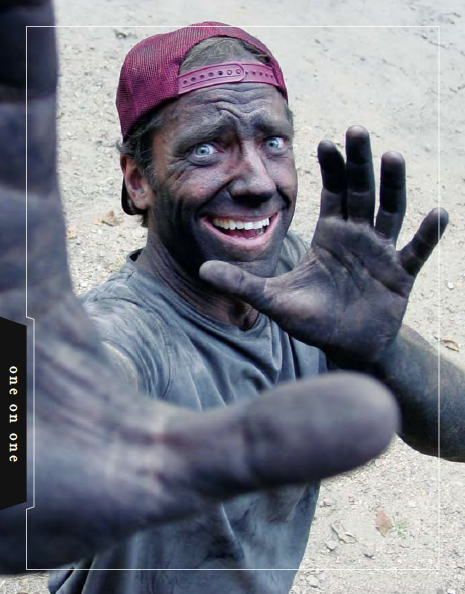by Noah Graff

Mike Rowe hosts the Discovery Channel’s hit program Dirty Jobs. He’s leaped into a multitude of blue-collar occupations including some off-the-beaten-path jobs: Shark Suit Tester, Copper Foundry worker, and Road Kill Removal Specialist. No matter how disgusting, dangerous or strenuous the job, Rowe continues to approach it with enthusiasm.
NG: What jobs did you aspire to do when you were a kid?
MR: I honestly had no aspirations, at least none that I can recall. I mainly remember feeling panicked by the idea of doing any one particular thing for the rest of my life.
NG: What is the “dirtiest” job you’ve ever had to do?
MR: Removing a broken lift pump from a wastewater treatment facility has to be near the top of the list. Someone must enter the shaft from the bottom, swim through tons of human waste, climb to the top of the pump, and tie off a cable. Unforgettably bad.
NG: What’s the strangest job you’ve done – on or off the show?
MR: I worked the midnight shift at the QVC Cable Shopping Network for three years. I also sang in the opera for a few years. A great place to meet girls while dressed like a Viking.
NG: In what job have you felt most endangered for your life?
MR: Shark suit tester, lumberjack, coal miner, alligator farmer, golf ball recycler – in no particular order.
NG: What’s the most physically difficult job you’ve had to do?
MR: In terms of physical abuse, it’s hard to separate the agonies of railroad work from hot-tar roofing, or indoor deconstruction from blacksmithing. Anything that involves swinging a sledgehammer for 12 hours in a row is going to leave an impression.
NG: What is something that you would absolutely refuse to do?
MR: Direct.
NG: How do the people you are working with feel about their jobs?
MR: The people I meet, by and large, appear happier, more balanced, and better adjusted than most of my friends with white-collar jobs. They genuinely seem to love what they do. Most of them seem to be in on some sort of joke that your typical professional doesn’t get.
NG: What’s the most important thing you’ve learned from all of the jobs you’ve had?
MR: One of my favorite lessons is the importance of having visual cues in our daily work lives, and the forgotten benefits of working on a job that allows you the satisfaction of having actually done something. Bricklaying, road-kill removal, whatever. Seeing a finished product or the fruits of your labor is something a lot of the white-collar workforce no longer experiences, and it’s important.
NG: If forced to choose one job from the show as your lifelong occupation, which would you choose?
MR: I think I’d like to run the machines at a scrap metal yard. The magnet, the claw, the shredder; they are all very satisfying. Farming taro in Hawaii was also gratifying. I wouldn’t eat the poi, but farming the taro is good fun.
NG: How do you stay so upbeat and positive?
MR: I get to leave at the end of the day.
NG: If you could work alongside anybody living or dead for one day, who would that be?
MR: That’s a tough one. I’d like to navigate a riverboat with Mark Twain, or maybe drive some spikes with John Henry. I’d like to see if he really died with a hammer in his hand. Mostly, I believe I’d like to split some logs with my grandfather.

5 Comments
“Seeing a finished product or the fruits of your labor is something a lot of the white-collar workforce no longer experiences, and it’s important.” That is what people who work in semiconductor wafer fab don’t get to see, fruit of their labor. Wafer goes in and wafer come out and it looks the same.
I’ve been working as a machinist for the past few weeks. I certainly get to see the fruits of my labor. We start with a block or a round of steel or some other material, and remove the stuff until it matches a component on a drawing, using mill machines, lathes, drills, cutting tools and precision measuring equipment. It’s not as dirty as some of the jobs Rowe tackles, but rewarding no less to see a fine product done after hours of labor.
Pingback: One on One with Mike Rowe of “Dirty Jobs” | Todays Machining World
Mike Rowe has to be admired for his quest to shine a much needed brighter image on industries like manufacturing in America.
I truly think that high school counselors share a very large part of the blame for lack of students getting into “hands on” working with machines as provided by many high schools and junior colleges. Most have no clue whatsoever as to what good paying jobs are available after learning these skills. With the politics that we have these days I don’t see that changing any time soon. Everyone is encouraged to get that four year degree instead!